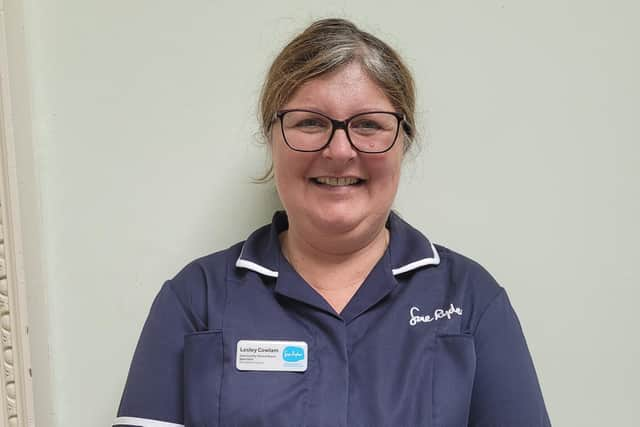Retiring Sue Ryder nurse reflects on palliative care, working with MS and 30 years of supporting people at home in Leeds
If there’s one message that Sue Ryder nurse Lesley Cowlam wants to emphasise as she retires after nearly 30 years with the charity, it’s that end of life care is not an ‘unhappy’ field to work in.
“I just wish people realised that it is not all doom and gloom and there should be no fear factor about palliative care,” says the 55-year-old from Wetherby.
Advertisement
Hide AdAdvertisement
Hide Ad“I have seen the fear people have when they first answer the door to me. They think ‘Am I that bad to need a palliative nurse to come to see me?’ but they really needn’t be frightened. We are a help tool, encouraging them to achieve the things they want to do at the end of their life. We can offer such supportive nursing at this time.”


Lesley joined the charity, which supports people through terminal illness, neurological conditions or losing loved ones, in a community nursing role in 1994. She is hanging up her nurse’s uniform following 28 years of caring for people across Leeds, where she worked as a community nurse specialist at Sue Ryder Wheatfields Hospice.
“Palliative care is not an unhappy area to work in,” she says. “I have met so many people and families I would not usually meet, and I would not have had any of the conversations I have had over the years if it were not for this job.
“You meet many families that are offering you different conversations and insights into their lives and you learn so much. I have always felt really humbled by that.”
Advertisement
Hide AdAdvertisement
Hide AdLesley moved from Grimsby to Leeds to study nursing and has also worked as a district nurse and at a cancer hospital. Going into people’s homes to give care in the community with Sue Ryder is something she has found particularly rewarding and it is the patients, she says, that she will “always remember”.
“When you are in someone’s home you see the family pictures on the wall and you immediately see they are an uncle, a father or a son and all the many different things that person is in their life. For me that has always been the draw of working in the community.”
“I remember the times I trudged through the snow to get to someone’s house or we had to climb through windows when someone couldn’t get to the door,” she adds. “And that is the nature of working in the community. You see the raw end of life and everyone has their own way of living.”
While Lesley, who retired earlier this month, has been there for countless patients and families in her career, Sue Ryder and her colleagues have supported her too, particularly after she was diagnosed with lifelong condition Multiple Sclerosis.
Advertisement
Hide AdAdvertisement
Hide Ad“They have always been so encouraging and supported me through ill health, helping with the practical elements so I could carry on with my job – arranging for me to park nearby or arranging for voice activated computers,” she says.
“It is not easy to continue working through a chronic condition, but I don’t shy away from having MS as it is something I have to live with. I like to say Sue Ryder Wheatfields Hospice knows how to work with me and I know how to work with them.”
Lesley says she is grateful for everyone who has touched her working life - patients, colleagues and families.
“My own family have supported me through the whole of my career in palliative care too and I am so grateful to them,” she reflects.
Advertisement
Hide AdAdvertisement
Hide Ad“My children have grown up with palliative care as part of their world and they are not scared to talk about death or things that are painful and I am proud of them for that.
“Working in palliative care for this length of time you do need support – from your colleagues, friends, family and managers. They have all played a part - even my little dog. This job has made me stronger and broader and has changed my thought processes in life.”
Support The Yorkshire Post and become a subscriber today. Your subscription will help us to continue to bring quality news to the people of Yorkshire. In return, you'll see fewer ads on site, get free access to our app and receive exclusive members-only offers. Click here to subscribe.
